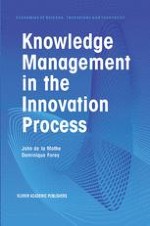2001 | OriginalPaper | Buchkapitel
Investing Knowledge in Universities
Rethinking the Firm’s Role in Knowledge Transfer
verfasst von : David A. Wolfe, Matthew Lucas
Erschienen in: Knowledge Management in the Innovation Process
Verlag: Springer US
Enthalten in: Professional Book Archive
Aktivieren Sie unsere intelligente Suche, um passende Fachinhalte oder Patente zu finden.
Wählen Sie Textabschnitte aus um mit Künstlicher Intelligenz passenden Patente zu finden. powered by
Markieren Sie Textabschnitte, um KI-gestützt weitere passende Inhalte zu finden. powered by
Over the past decade, the industrial economies have experienced a dramatic wave of economic and political change. According to the OECD, most industrial economies are undergoing the transition to knowledge—based economies in which the production, use, and distribution of knowledge and information are critical for the process of innovation and economic growth. Current trends in information technologies and the development of global communications networks accentuate the importance of scientific knowledge for the future growth of the economy. The knowledge—based economy (KBE) highlights the production of knowledge in networked institutional settings, and the ability to distribute that knowledge to the relevant components of the innovation system (OECD, 1996a). In this context, universities occupy a critical and somewhat unique role as the primary source of `knowledge workers’ for the knowledge—based economy, as well as an increasingly central source of the key factor of production in the new economy - knowledge itself. As a survey in The Economist pointed out, in this view, the university is portrayed “not just as a creator of knowledge, a trainer of young minds and a transmitter of culture, but also as a major agent of economic growth: the knowledge factory, as it were, at the center of the knowledge economy” (David, 1997, p. 4).
